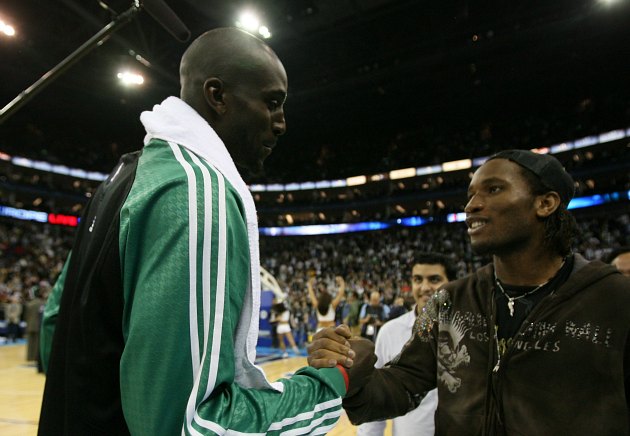
In April 2011, it was announced that Miami Heat mega-star LeBron James had purchased a small ownership stake in the legendary English soccer club Liverpool. It was a smart business decision, and not because there would be an obvious return on investment. Instead, the association gave LeBron a good chance of increasing his reach and becoming the global icon he wants to be.
Kevin Garnett doesn't have LeBron's popularity, but he is a bona fide soccer fan. As he enters the twilight of his career, KG is looking for other opportunity sports. So, naturally he sought out a similar minority interest in the Italian Serie A club AS Roma. He had a deal worked out this December, too, until NBA protocol got in the way. Frank Dell'Apa has the details for The Boston Globe (via PBT):
Kevin Garnett has a strong rooting interest in soccer, Chelsea and AC Milan his preferred clubs. There are several US-based owners of major European clubs, and Garnett last year decided to join them by agreeing to chip in to AS Roma. About the same time, LeBron James joined Fenway Sports Group, which controls Liverpool FC.
When the teams met last month in an exhibition at Fenway Park (Roma beat Liverpool, 2-1) it was revealed Garnett had been excluded from financial involvement with Roma. The NBA blocked the move because AS Roma's principal investor is Celtics part-owner James Pallotta.
"If you enter into a business agreement with the owner of a team that doesn't involve playing service, there are potential problems," a league source said. "Maybe not in this case. But there is a chance of, say, making a contract a lot larger."
James is allowed to invest in Liverpool because Fenway Sports Group has no connection with the NBA. [...]
There was hope for an exception to be made because Garnett's investment would have been drawn from a blind trust administered by his attorney. But the NBA said no dice.
Sadly, this decision has kept us from imagining KG hanging out with Roma legend Francesco Totti, diminutive forward Bojan Krkic, and American midfielder Michael Bradley. That's an eclectic group as is — introducing Garnett into it for even a few minutes could have resulted in something truly special.
Nevertheless, this is a perfectly logical reason to deny Garnett's ownership, even if the blind trust would have assuaged any fears of contract manipulation by Pallotta and his partners with the Celtics. It's especially notable given that Garnett re-signed with the Celtics for below-market value a month ago. There's obviously no proof that the franchise worked out a way to pay Garnett in a way that subverts the salary cap, but these rules are in place to make sure those underhanded deals don't happen, whether they're readily apparent or not.
On the other hand, it's easy to imagine these restrictions becoming infeasible within a decade. At the moment, Fenway Sports Group is an outlier in that not many organizations control teams across multiple sports. But the course of business suggests that franchises will continue to consolidate under fewer and fewer ownership groups, so that eventually various conglomerates might own one team in each of the world's major sports leagues. FSG is certainly on that path right now.
If that development occurs, it is going to be extremely difficult for any one league to restrict a player's ownership stakes in another sports team for the reason that stopped KG from owning part of Roma. The only practical means of restricting it, really, might be to bar them for these ownership conglomerates to collude and bar any of their athletes from holding interest in any of their associated teams. That's a pretty strict rule, and one that likely wouldn't be very popular if brought up in collective bargaining talks.
We're a long way off from that discussion, but it's worth considering in light of KG's bad news. Or, you know, we could all just act like him and yell indiscriminately. The choice is yours!
No comments:
Post a Comment